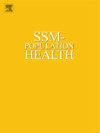Unincorporation in counties as a political determinant of health: An exploration of five states
IF 3.6
2区 医学
Q1 PUBLIC, ENVIRONMENTAL & OCCUPATIONAL HEALTH
引用次数: 0
Abstract
Local government policies and practices shape the context of the places that can alter a population's life chances through socioeconomic factors, built environments, and healthcare access. County governments, one of the most ubiquitous U.S. political structures, impact health outcomes within their jurisdiction through multiple policy levers and pathways. By identifying which political determinants within counties are associated with variation in life expectancy and premature death, we can better intervene on modifiable factors. One overlooked political determinant from public health studies is the county's responsibility as the primary local government for approximately a third of the U.S. population and 93% of land in unincorporated areas. To conduct an ecological study and assess associations between county population health and county responsibility for unincorporated areas and populations, we created and tested two county indicators of unincorporation. Multilevel multivariable regression results showed that larger proportions of unincorporated land within a county are associated with lower average county life expectancy. More testing of the measurement is needed to understand the relationship between unincorporation, county government, and population health outcomes.
非合并县作为健康的政治决定因素:对五个州的探索
地方政府的政策和实践塑造了地方的背景,可以通过社会经济因素、建筑环境和医疗保健获取来改变人口的生活机会。县政府是美国最普遍的政治结构之一,通过多种政策杠杆和途径影响其管辖范围内的卫生结果。通过确定国家内部哪些政治决定因素与预期寿命的变化和过早死亡有关,我们可以更好地干预可改变的因素。在公共卫生研究中,一个被忽视的政治决定因素是县作为大约三分之一的美国人口和93%的非建制地区的主要地方政府的责任。为了开展生态研究并评估县人口健康与县对非建制地区和人口的责任之间的关系,我们创建并测试了两个县非建制指标。多水平多变量回归结果表明,县域内非建制土地比例越大,县域平均预期寿命越低。需要对测量方法进行更多的测试,以了解非合并、县政府和人口健康结果之间的关系。
本文章由计算机程序翻译,如有差异,请以英文原文为准。
求助全文
约1分钟内获得全文
求助全文
来源期刊

Ssm-Population Health
PUBLIC, ENVIRONMENTAL & OCCUPATIONAL HEALTH-
CiteScore
6.50
自引率
2.10%
发文量
298
审稿时长
101 days
期刊介绍:
SSM - Population Health. The new online only, open access, peer reviewed journal in all areas relating Social Science research to population health. SSM - Population Health shares the same Editors-in Chief and general approach to manuscripts as its sister journal, Social Science & Medicine. The journal takes a broad approach to the field especially welcoming interdisciplinary papers from across the Social Sciences and allied areas. SSM - Population Health offers an alternative outlet for work which might not be considered, or is classed as ''out of scope'' elsewhere, and prioritizes fast peer review and publication to the benefit of authors and readers. The journal welcomes all types of paper from traditional primary research articles, replication studies, short communications, methodological studies, instrument validation, opinion pieces, literature reviews, etc. SSM - Population Health also offers the opportunity to publish special issues or sections to reflect current interest and research in topical or developing areas. The journal fully supports authors wanting to present their research in an innovative fashion though the use of multimedia formats.
 求助内容:
求助内容: 应助结果提醒方式:
应助结果提醒方式:


